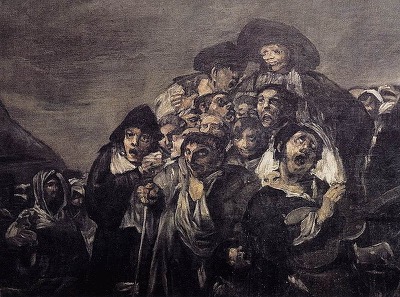Pilgrimage

Francisco de Goya y Lucientes - A Pilgrimage to San Isidro (between 1820 and 1823)
[The theme of the loss of identity in crowds in this painting can be seen as a precursor to expressionist painting (en.wikipedia.org)]
"Having left as someone else, he returns with his freshly blessed self again."
It might be a curiosity unique to the criminal mind to believe in the concept of a clean getaway, for there are none. One might wish there were such a thing, and even deeply believe that they have pulled one off, but once fleeing, the possibility of getting caught remains until you're arrested, and until then, you're haunted by the prospect of being found out, more refugee than free. I suppose the more dedicated sociopaths can convince themselves that they got away Scott-free, but even they are actually fleeing, even if they don't acknowledge this fact. If only they could leave themselves behind like they left the scene of the crime, they might actually escape. The fundamental problem with getaways lies in trying to flee one's self, but that one cannot be left behind. The old life might be readily abandoned, but the old self insists upon tagging along, and the old self, however unwanted by the prospective escapee, shows up on wanted posters and the gunman cannot help but drop into old haunts. Somebody will sooner or later spot them there. ©2020 by David A. Schmaltz - all rights reserved
Contrary to every airline advertisement ever written, there are no getaways, not really. Escapes are possible, though complicated by a condition whereby the payback involves coming back. One must always return, whether voluntarily or through coercion, but while one might well escape as they are, they can only ever return as someone slightly different, for escaping, even for a while, tends to change one. If one can never return home, a different one from the escaping one must always come back, no exceptions allowed, this one subtle substitution absolutely insisted upon. Temporary escapes are allowed here, but at a price exacted in personal change. Leave, and you'll never be the same again, so in a very real sense, there's really no escaping, either, for escaping becomes a form of self annihilation or transformation, an abandonment of former self.
Perhaps it's more enlivening to engage in the age-old practice of Pilgrimage. A Pilgrimage amounts to a getting into more than a getting away. It delivers through immersion the kind of renewal falsely expected by a getaway and only imagined with an escape. A Pilgrimage insists upon devotion contributed by the pilgrim, who engages more to give than to receive. The Pilgrim temporarily forfeits identity to experience through close association with others similarly suspending theirs, something greater than any isolated individual identity could muster. God, saint, nature, mammon, it might not matter the object of such devotion. The devotion matters most. The suspension of the reverberating me, me, me seems transformative, often ecstatic. A heightened sense of genuinely belonging emerges in a broader and deeper sense than any membership might induce. Neither getaway nor escape, something renewing gets into you when pilgriming, perhaps that something might even be yourself.
The Muse and I opted to take the back route, the one promising more than an hour longer drive, the one avoiding the frantic freeway. I commented that we'd seemed to have somehow avoided the Friday afternoon escape traffic. The Muse observed that this might have been due to the fact that it was only Tuesday. After days lose their individual meaning, the self trails along. The Muse and I didn't so much leave right on time, the shells of our selves did. We didn't know who we were then. I'm unsure who was driving. Whether we actually left remains an open question. Someone left. Two people. Refugees, I suspect, wandering not aimlessly but purposefully, perhaps and most probably seeking themselves. Aspens flashed color as someone passed up to the headwaters of the West Branch of the South Fork of the South Platte River through a series of serious switchbacks, almost to the tree line eleven thousand feet and then some up. Someone came down again to stumble through a crude little hippy grocery and on and into a more corporate one. They found their hovel, an offseason ski chalet condo, and settled in. This felt different. That it felt at all suggested that some shred of ourselves might have still inhabited those fleeing shells.
The Pilgrim travels to find himself. He was lost when he left and hoped to be found by fleeing into something greater than he ever was or ever hopes to become. A reckoning occurs along the way, a reconciling, shell with self, restoring something somehow formerly lost along the way. It never matters why. An enlivening occurs enabling one to return whole, as they almost remember they once were, enriched though also somehow poorer. They forfeit a once sacred routine, the one which had crowded out a truly significant something in their lives and left their soul cowering and overwhelmed. Some call this a retreat, but it's a reverse advance back into something, and not mere mindless fleeing. The Pilgrim returns because he finally can return. Having left as someone else, he returns with his freshly blessed self again. Amen.


